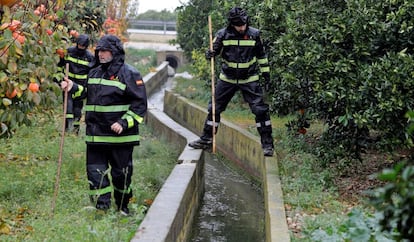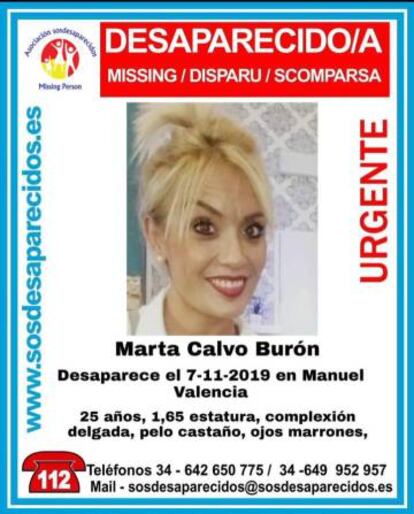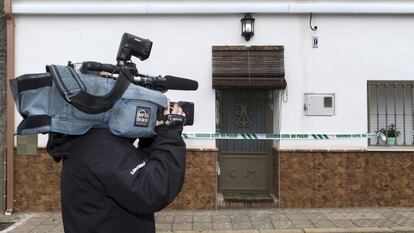Suspect admits chopping up body of Spanish woman but may avoid prison
Jorge Ignacio Palma claims Marta Calvo died from a heart attack after she took cocaine, and might only be fined for irregularly disposing of the corpse

When Jorge Ignacio Palma admitted to the Spanish Civil Guard on Wednesday that he had chopped up the body of Marta Calvo, it appeared that he had confessed to her murder and that the case was practically closed. But this may just have been a defense strategy.

Officers had been looking for the 38-year-old for nearly a month in connection with the disappearance of Calvo, who went missing on November 7 after going on a date with the suspect, whom she met online.
In his statement, Palma said the 25-year-old woman from the eastern region of Valencia had died from a heart attack after taking cocaine during a risky sexual practice known as a “white party,” which involves consuming cocaine via the genitals, according to sources close to the investigation.
Palma, who has a criminal record and served jail time in Italy in 2008 for trafficking high-quality cocaine, told police that he panicked and decided to get rid of the corpse. He confessed to chopping up her body and disposing of the parts in different dumps in the Valencian municipality of Manuel and the surrounding areas.
If Calvo’s body is not recovered or other evidence, such as witness testimony, does not emerge, it will be very difficult to disprove Palma’s version of events, according to a judge, a professor of criminal law, a public prosecutor and a lawyer unconnected to the case, who all asked not to be identified.
Shockingly, chopping up the body of a person you have not murdered and dumping the remains is not a crime in Spain, but rather an administrative infraction for breaking mortuary regulations. It is only punishable by a fine.
By confessing to cutting up the cadaver, Palma has protected himself from the discovery of possibly incriminating bloodstains in his car or home, according to expert sources, meaning the police will need more evidence of signs of violence to prove he was guilty of murder.
What’s more, although Palma confessed to taking cocaine, sources say he cannot be charged with trafficking because the drugs were shared in a “private environment.”

Palma’s claim that Calvo’s death was accidental, however, is weakened by the fact that if this had been the case he should have told the police, so that it could be confirmed by a forensic team. Palma was also involved in the death of another woman in April. In that case, the suspect, who is from Colombia but has lived in Spain for years, had sex with a Brazilian prostitute in a brothel in Valencia. According to police sources, the woman began to have convulsions after consuming cocaine during a similar sexual act to the one Palma says he practiced with Calvo. She died a few days later, and her body was repatriated to Brazil.
A security camera caught Palma running from the room as she was having convulsions, but he was not charged with the crime of failing to rescue a person in need.
English version by Melissa Kitson.
Tu suscripción se está usando en otro dispositivo
¿Quieres añadir otro usuario a tu suscripción?
Si continúas leyendo en este dispositivo, no se podrá leer en el otro.
FlechaTu suscripción se está usando en otro dispositivo y solo puedes acceder a EL PAÍS desde un dispositivo a la vez.
Si quieres compartir tu cuenta, cambia tu suscripción a la modalidad Premium, así podrás añadir otro usuario. Cada uno accederá con su propia cuenta de email, lo que os permitirá personalizar vuestra experiencia en EL PAÍS.
¿Tienes una suscripción de empresa? Accede aquí para contratar más cuentas.
En el caso de no saber quién está usando tu cuenta, te recomendamos cambiar tu contraseña aquí.
Si decides continuar compartiendo tu cuenta, este mensaje se mostrará en tu dispositivo y en el de la otra persona que está usando tu cuenta de forma indefinida, afectando a tu experiencia de lectura. Puedes consultar aquí los términos y condiciones de la suscripción digital.








































